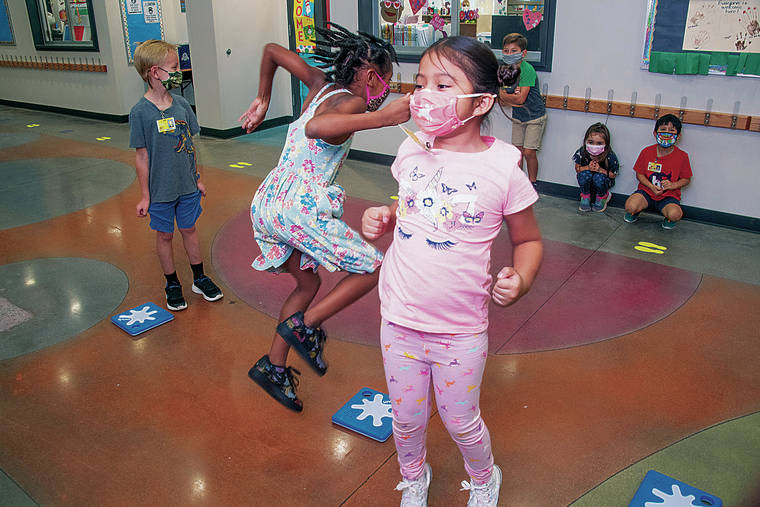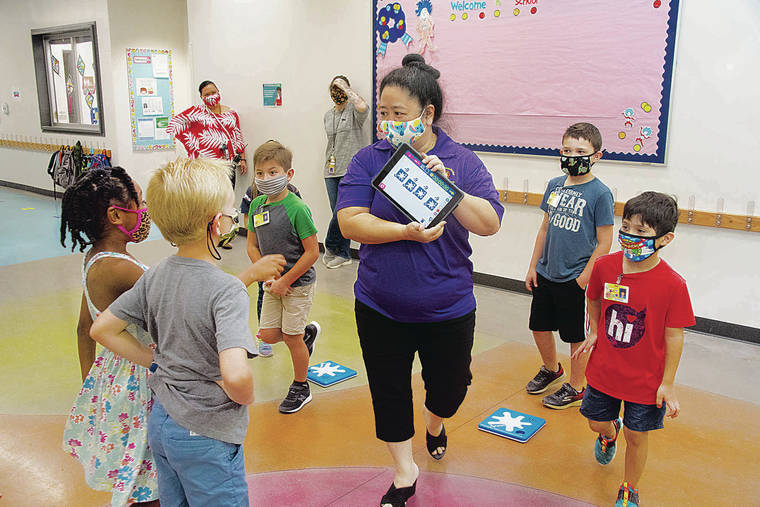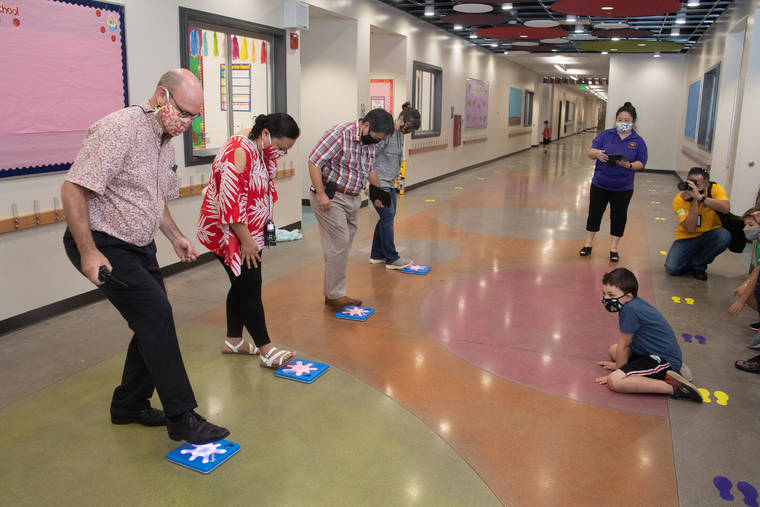New tool demystifies coding for students as Hawaii legislators push computer science to younger grades

CRAIG T. KOJIMA / CKOJIMA@STARADVERTISER.COM
Solomon Elementary is piloting a new approach to computer science education that combines coding, exercise and active play. The learning tool is called Unruly Splats and features floor tiles that are programmable. Students use their hands to code and their feet to play the games they create, jumping around and stomping on the Splats during an Unruly Splats session. It’s part of a push for innovative computer science education at the Leilehua complex of schools.

CRAIG T. KOJIMA / CKOJIMA@STARADVERTISER.COM
Teacher Judy Tateyama shows students their scores at Solomon Elementary. The Unruly Splats learning tool is part of a push for innovative computer science education at the Leilehua complex of schools.

CRAIG T. KOJIMA / CKOJIMA@STARADVERTISER.COM
Solomon Elementary Principal Thomas Swan, far left, plays Unruly Splats.



First graders at Solomon Elementary School squealed and cheered as they skipped past and then stomped on bright blue floor tiles that lit up, changed color and made sounds.
“When do I get to play?” asked one eager girl, Arianna, just moments after she’d had a turn. “This feels like playing on the playground.” Her classmate, Dominick, chimed in: “It’s fun, exciting and challenging!”
The square mats, called Unruly Splats, might seem like pure fun, but they introduce children to computer coding at a basic level. Each durable square has a “splat” that looks like a splash of paint. The tiles are connected wirelessly to a tablet or similar device where they are programmed.
Kids start by playing pre-loaded games with the Splats, then learn to alter the block code that programs them, and eventually they can create their own games.
The educational tool is being piloted this spring in the Leilehua complex of public schools in Wahiawa, starting with three campuses. Grant Toyooka, a resource manager who is leading the effort, said Splats meet multiple needs for students, including social skills, exercise and logical thinking.
The initiative comes as state legislators are pushing for computer science in younger grades, building on their mandate that Hawaii’s public high schools offer such courses. Senate Bill 242 Opens in a new tab calls for integrating computer science content into the curriculum at elementary and middle schools on a phased basis over the next four years.
Don't miss out on what's happening!
Stay in touch with breaking news, as it happens, conveniently in your email inbox. It's FREE!
Act 51, passed in 2018, spurred high schools to offer more computer science courses and the Department of Education to develop a statewide plan for computer science curriculum starting in kindergarten.
Solomon Elementary, which serves military children on Schofield Barracks, began using Unruly Splats this quarter and will be followed by Wheeler Elementary next quarter. The kit is part of an array of tech offered at Solomon’s maker space, including 3D printers and miniature robots such as Spheros that older kids program.
“We want the kids from kindergarten all the way up to be prepared to be future innovators,” said Solomon’s principal, Thomas Swan. “We educate the whole child. We have to make sure these students have a well-rounded education, so we value the integration of technology literacy.”
State Sen. Donovan Dela Cruz, the bill’s lead sponsor, said all students need to be “prepared for an increasingly digital world,” a shift that has been hastened by the coronavirus Opens in a new tab pandemic. The legislation, which also sets up a computer science special fund, was approved unanimously by the Senate and now goes to the House Education and Finance committees. The Department of Education supports it.
Toyooka, who has a background in counseling, says the pandemic also has underscored the importance of social connection and physical activity. Unruly Splats get students to engage with each other, he said.
“When we saw this platform that introduced computer science but with social-emotional learning, our eyes lit up,” he said. “And there’s a lot of physical movement for those kinesthetic learners.”
A legislative grant in 2019 to promote computer science education will cover the Unruly program for three years in the Leilehua complex, including coaching, online resources and technical support, Toyooka said. A spokesman for Unruly Studios said pricing varies depending on the size of the school, but membership is typically less than $10 per student per year.
Splats are typically aimed at elementary and middle schoolers, as a way to demystify computer science, but can be used at any level.
Students at Leilehua High School already have excelled nationally in CyberPatriot competitions with cybersecurity and other high-level digital challenges. But the school’s library media specialist, Jenny Yamamoto, sees a place for Splats as well in the learning commons for other teens who might otherwise shy away from computer science.
“As more classes transition back to in-person, teachers are coming to the library looking for tools just like this to engage their students both mentally and physically,” Yamamoto said.
Melanie Zukeran, who teaches first grade at Solomon, considers the floor mats an attractive option for tech-shy educators as well.
“Splats is a fun way to integrate different curricular areas,” Zukeran said. “It’s a good outlet for kids. It’s fun, even for me. And it’s easy to do, if you’re scared about the technology part.”
“It’s a great way to incorporate some PE and (academic) standards with electronics,” she added. “They hop, skip, do motor skills to a Splat, and then they do academic things when it goes off — like spelling, phonics, math.”
Asked whether the kids are too young to tackle computer science, she replied, “Oh, no, never!”
“They’re surrounded by technology so much these days, you know, like at home, and so they catch on really quick,” Zukeran said. “If you slowly introduce it in the lower grades, by the time they move up, they have a solid background in it.”



